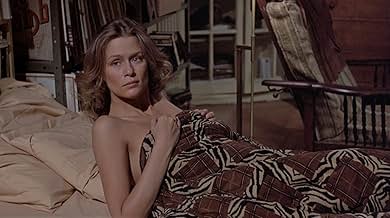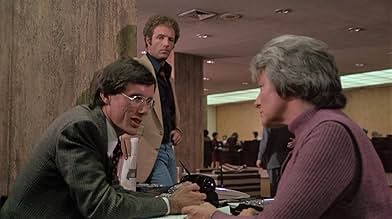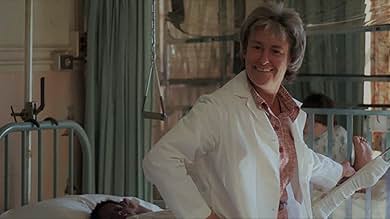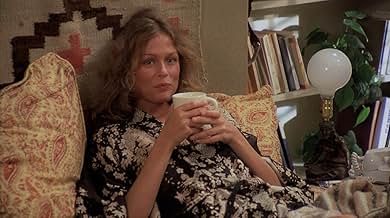Literature professor Axel Freed is a gambling addict. When he has lost his money, he borrows from his girlfriend Billie, then his mother Naomi, and finally some criminals that chase him. Des... Read allLiterature professor Axel Freed is a gambling addict. When he has lost his money, he borrows from his girlfriend Billie, then his mother Naomi, and finally some criminals that chase him. Despite all of this, he cannot stop gambling.Literature professor Axel Freed is a gambling addict. When he has lost his money, he borrows from his girlfriend Billie, then his mother Naomi, and finally some criminals that chase him. Despite all of this, he cannot stop gambling.
- Awards
- 1 nomination total
- Director
- Writer
- All cast & crew
- Production, box office & more at IMDbPro
7.17K
1
2
3
4
5
6
7
8
9
10
Featured reviews
Worth the Gamble
I saw this movie back in 1974/75 when it was released. I was already a Caan man. My comments are just random tidbits. Burt Young would go on to join Caan in 1975's The Killer Elite". Monkey (London Lee) was a stand-up comic who appeared numerous times on the Ed Sullivan show in the 60's. Lauren Hutton would trade Caan for Burt Reynolds in Gator. Caan earlier had beat out Burt for the role of Sonny Corleone. The line I remember most from this film is when Axel's mother is trying to get a bank loan to fund his gambling debt. There are some bureaucratic snafus and the bank officer isn't sure he has the proof to approve the loan to mom. Caan says "I came out of her womb and I know she's my mom. Now give her the god... money!".
A Forgotten Mainstream Character-Study or Neglected Cult Film?
In pop culture, before you had to "know when to walk away, know when to run," THE GAMBLER was synonymous with a Fyodor Dostoevsky novel and transcended into this 1970's film written by James Toback, directed by Karel Reisz and starring James Caan as university professor Axel Freed...
But Axel's real story isn't his job, but his vice, practically a religion: that of gutsy yet brainless gambling...
An addiction making him the user/loser of other people's money, including his own mother (more of a flirtatious step sister). But, while it's great seeing Caan facing the dark side of human nature, there's a lot to be desired when, for instance, he gets in over his head... and then some...
Shady characters come and go and sometimes return, ranging from Burt Young to Paul Sorvino, but their threats aren't all that... threatening. And while each performance is fitfully capable, it's as if the bookies, along with the audience, are passive observers to Axel's reckless and often ridiculous impulses.
Scenes with an extremely patient girlfriend/ingenue Lauren Hutton are overlong and distracting; her part feels tacked-on, mostly. And inside the classroom, as lecturer, Caan doesn't seem completely legit; he pulls off the roguish gambling addict better than a member of such a prestigious academia (plus he's an author), looking more like a tough guy football coach doubling as teacher...
Meanwhile, sporadic and strategic illegal backroom gambling sequences (filled with mafioso-looking inhabitants) lack the kind of severely desperate tension that these grungy locations aesthetically promise...
With so much to lose in each hand or roll of the dice or turn of the wheel, we should be biting our nails, and so should he... although a quick trip to Las Vegas does up the ante, injecting a needed dose of existential suspense into the otherwise languid visual prose.
Overall, Caan's steely reactions to the bottom continuously falling out are a standout... albeit kind of a shame since he often slips out of trouble faster than it takes to maintain an edgy pulse throughout; it's like watching a diver swim with toothless sharks...
And yet, if you're a fan of the infectiously likeable square-jawed actor (a perfectly equal hybrid of cult and mainstream cinema) this is definitely an intriguing two-hour melodrama that actually gets better with each viewing. What initially seems rather mundane becomes a voyeuristic character-study with subtle yet calculating finesse...
And given the ensemble-friendly era, there are a host of recognizable actors like one perturbed bookie, Jimmy, played by Carmine Caridi (who Francis Ford Coppola originally had in mind for what became Caan's game-changing role as Sonny Corleone in THE GODFATHER: then switched to a killer cameo in the sequel): He rules a memorable scene providing a deeper glimpse into Axel's addiction, and what might be the consequences...
Then there are future TV-fixtures Antonio Fargas, Lawrence Hilton-Jacobs, Stuart Margolin and Vic Tayback. M. Emmett Walsh also turns up and as a weenie banker is another James... Woods...
Specifically, when playing on cable, Time Warner Cable's top-of-the-screen index description states very simply: "James Caan in a study in self-destruction." And, well... that's pretty much that...
What sets out to be a proverbial X-ray of the soul winds up merely exposing bones. Then again, THE GAMBLER leaves most of the fleshing-out for an impartial and ambiguous audience. Which isn't so bad either.
But Axel's real story isn't his job, but his vice, practically a religion: that of gutsy yet brainless gambling...
An addiction making him the user/loser of other people's money, including his own mother (more of a flirtatious step sister). But, while it's great seeing Caan facing the dark side of human nature, there's a lot to be desired when, for instance, he gets in over his head... and then some...
Shady characters come and go and sometimes return, ranging from Burt Young to Paul Sorvino, but their threats aren't all that... threatening. And while each performance is fitfully capable, it's as if the bookies, along with the audience, are passive observers to Axel's reckless and often ridiculous impulses.
Scenes with an extremely patient girlfriend/ingenue Lauren Hutton are overlong and distracting; her part feels tacked-on, mostly. And inside the classroom, as lecturer, Caan doesn't seem completely legit; he pulls off the roguish gambling addict better than a member of such a prestigious academia (plus he's an author), looking more like a tough guy football coach doubling as teacher...
Meanwhile, sporadic and strategic illegal backroom gambling sequences (filled with mafioso-looking inhabitants) lack the kind of severely desperate tension that these grungy locations aesthetically promise...
With so much to lose in each hand or roll of the dice or turn of the wheel, we should be biting our nails, and so should he... although a quick trip to Las Vegas does up the ante, injecting a needed dose of existential suspense into the otherwise languid visual prose.
Overall, Caan's steely reactions to the bottom continuously falling out are a standout... albeit kind of a shame since he often slips out of trouble faster than it takes to maintain an edgy pulse throughout; it's like watching a diver swim with toothless sharks...
And yet, if you're a fan of the infectiously likeable square-jawed actor (a perfectly equal hybrid of cult and mainstream cinema) this is definitely an intriguing two-hour melodrama that actually gets better with each viewing. What initially seems rather mundane becomes a voyeuristic character-study with subtle yet calculating finesse...
And given the ensemble-friendly era, there are a host of recognizable actors like one perturbed bookie, Jimmy, played by Carmine Caridi (who Francis Ford Coppola originally had in mind for what became Caan's game-changing role as Sonny Corleone in THE GODFATHER: then switched to a killer cameo in the sequel): He rules a memorable scene providing a deeper glimpse into Axel's addiction, and what might be the consequences...
Then there are future TV-fixtures Antonio Fargas, Lawrence Hilton-Jacobs, Stuart Margolin and Vic Tayback. M. Emmett Walsh also turns up and as a weenie banker is another James... Woods...
Specifically, when playing on cable, Time Warner Cable's top-of-the-screen index description states very simply: "James Caan in a study in self-destruction." And, well... that's pretty much that...
What sets out to be a proverbial X-ray of the soul winds up merely exposing bones. Then again, THE GAMBLER leaves most of the fleshing-out for an impartial and ambiguous audience. Which isn't so bad either.
Why not quit while you're ahead?
I grew up amongst gamblers, spending much of my time hustling bowling and gin rummy throughout the Midwest, until, at 17, I shuffled off to the Ivy-covered walls of a prestigious Eastern College.
This gives me much simpatico with Axel Freed, the central character and portrait of self-destruction, the gambler, and James Toback, the film's author. Toback's own reflections suggest that Axel is in many ways auto-biographical.
As a film, The Gambler is shortsighted, an ambitious but nonetheless failed attempt by a first-time screenwriter in difficult waters. It is not without its brilliance-its relentless dedication toward conveying that any gambler's true goal is not success, but utter humiliation-destruction of one's self, and anything and anyone around him. It can be no other way.
In the 1990's where independent film has achieved an emergence and respect in its own, a film like this might have found the strength among the very talented people involved, (Toback, James Caan, Karel Reisz) to emerge into a true gem. Alas this 70's neglected studio cast-off didn't have that opportunity.
London Lee is great in support, Paul Sorvino and Burt Young are well cast as Freed's mob-ties. Young's performance as a mob leg-breaker includes quite a raw, and shocking collection scene.
Probably a pass for any but the gambling addict, for them, a head (as in tape-head) burner. For those who are intrigued by Toback's intelligent approach to the seedier side, try his next effort, Fingers (1978), a diamond in the rough.
This gives me much simpatico with Axel Freed, the central character and portrait of self-destruction, the gambler, and James Toback, the film's author. Toback's own reflections suggest that Axel is in many ways auto-biographical.
As a film, The Gambler is shortsighted, an ambitious but nonetheless failed attempt by a first-time screenwriter in difficult waters. It is not without its brilliance-its relentless dedication toward conveying that any gambler's true goal is not success, but utter humiliation-destruction of one's self, and anything and anyone around him. It can be no other way.
In the 1990's where independent film has achieved an emergence and respect in its own, a film like this might have found the strength among the very talented people involved, (Toback, James Caan, Karel Reisz) to emerge into a true gem. Alas this 70's neglected studio cast-off didn't have that opportunity.
London Lee is great in support, Paul Sorvino and Burt Young are well cast as Freed's mob-ties. Young's performance as a mob leg-breaker includes quite a raw, and shocking collection scene.
Probably a pass for any but the gambling addict, for them, a head (as in tape-head) burner. For those who are intrigued by Toback's intelligent approach to the seedier side, try his next effort, Fingers (1978), a diamond in the rough.
A bit disturbing
From the first scene to the last I was on the edge of my seat. Bet after bet my stomach turned. Caan's Axel Freed is driven to hit the big one, but it never seems to come or be enough. He loves the thrill of losing and feels safe when he is at the bottom.
Watching Freed bet tens of thousands of dollars on whims is excruciating. This film is one huge car wreck that you can't turn away from. With each scene the damage gets worse and worse.
"If all my bets were safe they just wouldn't have any juice," he tells his bookie.
Axel is never happy--even when he is doing the thing he enjoys most. You can see the underlying dissatisfaction he has with his job, his life, and the universe in general. The only constant in his existence is the bet. Win or lose.
Freed is very adept at evading the lowlifes he owes his shirt to. It is a joyride for him to constantly "dodge the bullet". That is why each bet becomes riskier and riskier. He wants to see what will happen to him when all of his luck runs out.
At one point in the film Axel reads a passage from an essay on George Washington to his class. He and his students conclude that Washington was afraid of failure and that he tried to remove the element of risk from everything he did. It is the very antithesis of Axel's life as a gambler. He creates situations that are totally immersed in risk believing that it is the only way to ensure true success. All or nothing. He is willing to compromise not only himself, but anyone around him who cares about him. By displaying his dark, self-destructive side he gambles with their feelings and challenges them to either love him or leave him.
It was a special treat to see two actors (Cann and Sorvino) who are in two of the best crime movies ever made (The Godfather and Goodfellas) together in the same film.
Also Antonio Vargas is appropriately slimy as the Pimp (sort of an R-rated Huggy Bear).
There are some pivotal moments in the film like when Axel is told that he must get one of his basketball-playing students to fix a game; or when he confronts his millionaire grandfather after learning that he refused to cover his debt.
I won't give away the ending, but the payoff is not what you would expect in American cinema.
Watching Freed bet tens of thousands of dollars on whims is excruciating. This film is one huge car wreck that you can't turn away from. With each scene the damage gets worse and worse.
"If all my bets were safe they just wouldn't have any juice," he tells his bookie.
Axel is never happy--even when he is doing the thing he enjoys most. You can see the underlying dissatisfaction he has with his job, his life, and the universe in general. The only constant in his existence is the bet. Win or lose.
Freed is very adept at evading the lowlifes he owes his shirt to. It is a joyride for him to constantly "dodge the bullet". That is why each bet becomes riskier and riskier. He wants to see what will happen to him when all of his luck runs out.
At one point in the film Axel reads a passage from an essay on George Washington to his class. He and his students conclude that Washington was afraid of failure and that he tried to remove the element of risk from everything he did. It is the very antithesis of Axel's life as a gambler. He creates situations that are totally immersed in risk believing that it is the only way to ensure true success. All or nothing. He is willing to compromise not only himself, but anyone around him who cares about him. By displaying his dark, self-destructive side he gambles with their feelings and challenges them to either love him or leave him.
It was a special treat to see two actors (Cann and Sorvino) who are in two of the best crime movies ever made (The Godfather and Goodfellas) together in the same film.
Also Antonio Vargas is appropriately slimy as the Pimp (sort of an R-rated Huggy Bear).
There are some pivotal moments in the film like when Axel is told that he must get one of his basketball-playing students to fix a game; or when he confronts his millionaire grandfather after learning that he refused to cover his debt.
I won't give away the ending, but the payoff is not what you would expect in American cinema.
A Meditation On Losing
Sometimes he wins; but mostly he loses. Gambling is an addiction for Axel Freed (James Caan), a professor of English literature and lover of classical music. The film is set in New York City.
The object of the obsession can be almost anything on which a bet is placed: dice, cards, a basketball game, a college football match. It really doesn't matter. Axel just can't keep from making bets. He's like two different people. In a classroom setting, he is logical and intelligent. But when betting, he throws away the logic in favor of risk taking. In these situations he seems to lack the normal psychological "brakes" that could be applied to his destructive over-betting. In his own words: "I like the threat of losing". And always in the background are the thugs and the con men that lord over Axel, when he borrows to gamble, but can't pay his debt.
Some of Axel's classroom lectures have real thematic value. The ideas relate both to him, and incidentally to some modern-day politicians. For example, a person "... claims an idea is true because he wants it to be true, because he says it's true. And the issue isn't whether he's right, but whether he has the will to believe he's right, no matter how many proofs there are that say he's wrong". Axel continues: "D.H. Lawrence says Americans fear new experience more than they fear anything. They are the world's greatest dodgers, because they dodge their own very selves". Heavy stuff.
Despite a disappointing ending, "The Gambler" is an interesting character study of a personality type that is all too prevalent in modern society. The film's color cinematography is generally dark, in keeping with the film's theme. Overall acting is fine. Paul Sorvino gives an especially convincing performance, as does James Caan. The plot proceeds rather slowly.
Mostly, the film has terrific thematic value. It encourages the viewer to pause and reflect, to ponder, to question one's own motivations. That is a trait lacking in many current movies.
The object of the obsession can be almost anything on which a bet is placed: dice, cards, a basketball game, a college football match. It really doesn't matter. Axel just can't keep from making bets. He's like two different people. In a classroom setting, he is logical and intelligent. But when betting, he throws away the logic in favor of risk taking. In these situations he seems to lack the normal psychological "brakes" that could be applied to his destructive over-betting. In his own words: "I like the threat of losing". And always in the background are the thugs and the con men that lord over Axel, when he borrows to gamble, but can't pay his debt.
Some of Axel's classroom lectures have real thematic value. The ideas relate both to him, and incidentally to some modern-day politicians. For example, a person "... claims an idea is true because he wants it to be true, because he says it's true. And the issue isn't whether he's right, but whether he has the will to believe he's right, no matter how many proofs there are that say he's wrong". Axel continues: "D.H. Lawrence says Americans fear new experience more than they fear anything. They are the world's greatest dodgers, because they dodge their own very selves". Heavy stuff.
Despite a disappointing ending, "The Gambler" is an interesting character study of a personality type that is all too prevalent in modern society. The film's color cinematography is generally dark, in keeping with the film's theme. Overall acting is fine. Paul Sorvino gives an especially convincing performance, as does James Caan. The plot proceeds rather slowly.
Mostly, the film has terrific thematic value. It encourages the viewer to pause and reflect, to ponder, to question one's own motivations. That is a trait lacking in many current movies.
Did you know
- TriviaAccording to James Toback, before his screenplay was accepted at Paramount Pictures, and was making the rounds with actors, Peter Boyle was first interested in playing the lead. Robert De Niro lobbied hard for the role, to the point where De Niro started to dress like the writer. Toback pressured director Karel Reisz to meet with De Niro. After meeting him, Reisz said that he would not, and could not consider De Niro for the role, and if Toback kept insisting, he would not be allowed to collaborate on the film further.
- GoofsAxel knocks the pimp's hat off on the second punch. It reappears on his head on the following one.
- SoundtracksSymphony No. 1 in D
Written by Gustav Mahler (as Mahler)
Performed by Koninklijk Concertgebouworkest (as The Concertgebouw Orchestra)
Conducted by Bernard Haitink (as Haitink)
Courtesy of Philips Records
- How long is The Gambler?Powered by Alexa
Details
Box office
- Gross US & Canada
- $1,305,782
- Runtime
- 1h 51m(111 min)
- Sound mix
- Aspect ratio
- 1.85 : 1
Contribute to this page
Suggest an edit or add missing content



































